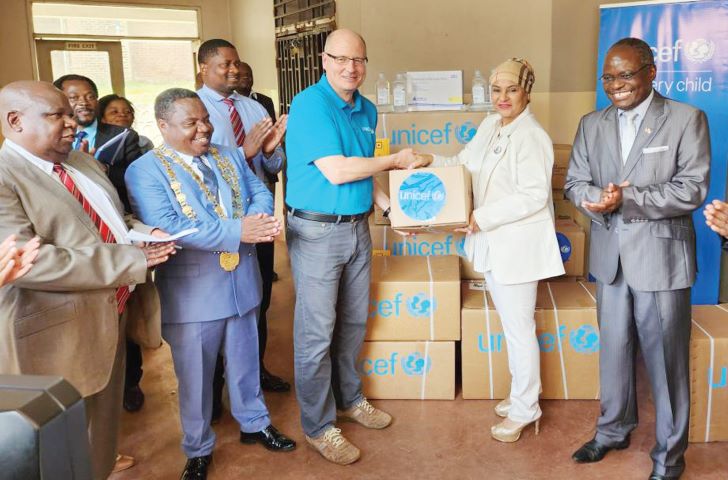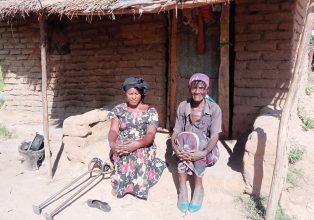Unicef delivers anti-cholera supplies
Bwaila Hospital is the second busiest of the 61 health facilities in Lilongwe, where frontline health workers are working tirelessly to save people’s lives from raging cholera.
The district overcame its last cholera outbreak in 2018, which claimed 18 lives from 388 confirmed cases.

Currently, the deadly diarrhoea, which thrives on unsafe water and poor sanitation, has killed 430 people out of the 7 650 patients in Lilongwe, exerting enormous pressure on healthcare facilities to save lives.
“Bwaila admits at least 45 to 60 cholera cases daily and one of our critical challenges is the availability of essential supplies to treat the patients,” says clinical officer Collins Nkhulazi, the focal person in the facility’s cholera treatment centre.
But there is a gap that calls for urgent support, he states.
“ B w a i l a h o s p i t a l management has been making efforts to ensure we have stocks of health supplies such as ringer’s lactate, but it has not been easy because the cases keep rising and many patients are coming to the hospital with severe dehydration,” Nkhulazi explains.
Similar sentiments are heard at Area 18 Health Centre, located about 8km from Bwaila. The facility also struggles to get adequate cholera treatment supplies such as ringer’s lactate.
“We have had situations where there have been no supplies for the entire day: no ringer’s lactate, no oral rehydration solution. This was common, especially in the initial days when we first started receiving cholera patients,” says the facility’s chief clinical officer Kedson Masiyano.
The health workers p e r s i s t e n t l y c a l l e d authorities at Lilongwe District Health Office to send them supplies, but they too did not have enough.
“Bwaila and other health facilities were also in dire need of the same supplies and they had more patients than us,” recalls Masiyano.
To help the overwhelmed health facilities respond effectively to the country’s worst cholera outbreak in decades that has since claimed more than 1,400 lives, Unicef and its partners are supporting the Government of Malawi with essential cholera supplies.
So far, Unicef has supported the Ministry of Health with life-saving health and water, sanitation and hygiene supplies worth over $470 000 and more supplies worth about $1.2 million have been ordered.
“We stand in solidarity with Malawi at this time of need. Since the very beginning when the outbreak was announced now almost a year ago, Unicef has been working closely with national authorities and other partners to support the government with its cholera response,” said Unicef representative Rudolf Schwenk.
The support includes training response teams at all levels, setting up cholera treatment units and providing health, hygiene and sanitation kits, oral cholera vaccines, life-saving drugs and other essential supplies for health facilities and in communities.
“ We h a v e a l s o been supporting the dissemination of cholera prevention, treatment and hygiene promotion messages in cholera-affected and cholera-prone areas,” he added.
Bwaila Hospital is one of the health facilities supported by Unicef. On February 7, the facility received part of the health, water, sanitation, and hygiene (Wash) and medical supplies worth $ 850,000 (about K 880 million).
Minister of Water and Sanitation Abida Mia received the supplies at the hospital and commended the many efforts from the UN children’s agency to scale up the cholera response in the country.
“On behalf of the Presidential Taskforce on the Response to Covid-19 and Cholera, we would like to appreciate the support from Unicef. This is a timely intervention that will help us save lives and combat the outbreak,” she said.
While handing over the supplies, the Unicef representative emphasised the need to use the limited resources wisely.
Schwenk stated: “We can do this through proper planning and estimating of quantities required in districts and strengthening the tracking and monitoring of supplies to ensure unimpeded and timely access to quality products and services.
“Frequent data sharing on supplies can also help in identifying the need and for prompt action and harmonized approach. A mechanism can be put in place for those districts that can control the outbreak to support other districts in need by sharing the remaining supplies.”
With the support Bwaila and Area 18 cholera treatment centres have been receiving from partners, frontline health workers say their supply stocks have improved, enabling health teams at the two facilities to reduce cholera deaths.
“We thank our health authorities and partners for giving us supplies and tents. Now we have the supplies that we need to scale up the response to the outbreak,” says Nkhulazi.




